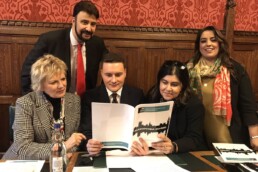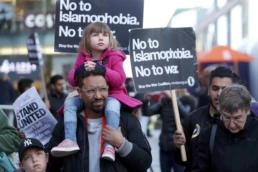It’s simplistic to argue that religious spaces need to be inclusive when we factor in that these spaces are less ‘religious’ than they are significantly ethno-cultural and sectarian – intended to protectively maintain an ethnic and denominational environment. Resolving feelings of marginalisation and prejudice won’t simply boil down to addressing anti-blackness and racism in ethno-cultural communities. There’s much more going on and much of it interrelated. Having thought about this issue and how to proceed effectively for a while, and trying out various things on the ground, here are some conclusions which I briefly explain.
1. Create new (or support already existing) institutions and/or communal spaces that actively cultivate shared cultural capital and undermine the predominance of any one ethno-cultural group. Cultivating such a space means that we undermine microaggressions, make inappropriate and divisive comments/behaviour distasteful whilst also teaching members social skills like how to read a room and/or locate a common language, attitude, behaviour, level of maturity or culture. For some this won’t be intuitive but it’s a welcome process.
Now to be clear, am I talking about ‘black’ mosques or spaces? No. As I’ve covered, ‘blackness’ is not a positive identity since it tells us nothing except of shared experience borne out of negative racialisation. Yes, many ethnic communities rally together to erect their worship houses, and they include Somali, Nigerian, and Ghanaian Muslim centres. But these are not ‘black’ spaces, they’re ethnic ones. So beyond an ethnic or racialised space, how do we create an environment which is a sanctuary from the ‘black/white experience’ (as well as the exclusion of women), but situates itself within a common culture that all Brits can appreciate? How can we remove the microaggressions and cultivate believers to locate shared cultural capital – people who can read a room? What we’re looking for are spaces that are neither racialised nor ethnicised but built around a positive and shared ‘British experience’.
Some will mischaracterise what’s being said and say that we can’t chart a different course for ourselves, but there doesn’t seem to be any reasonable explanation as to why we shouldn’t. Firstly, ethno-cultural communities charted their own courses and the same isn’t held for their endeavours. And the idea that we ought to ‘change the community from within’ erroneously assumes that there’s one unified community that we’re calling to abandon or sideline, but we’re merely highlighting the reality that Muslims make up various ethnic communities, each distinct and independent. Secondly, this response usually comes from members of those ethno-cultural communities who see what’s new as a threat to their own dominance. They’re not committed to inclusion and change, but simply fearful of being faded into obscurity by better examples of actual religious community. Thirdly, the amount of time and effort required to nominally change ethno-cultural communities simply isn’t worth it, the same can be put in elsewhere where better outcomes are achieved, and our families actually benefit along the way. There have been many well-meaning but failed endeavours, and nearly everyone I’ve spoken to has lamented the time they put in over decades and wish that they had simply contributed to building something positive anew, or where they were in the extreme minority, simply focused on the development of their own families.
2. In these newly created institutions and/or communal spaces, foster religious literacy centred around, and rooted in, the Quran’s meanings. We are believers who have inherited the scriptures (35:32). Whilst various companions of the Prophet would have their own individual focuses such as some given to scriptural study, some to acts of devotion, others to matter of the state, these tendencies didn’t become a means of differentiation within the group. The Prophet’s approach when cultivating community was to keep things simple and rooted in scripture where people would then focus on their own interests individually. There was a common and general narrative everyone conformed to, and this was the unifying thread between all believers. In our day, this helps to evade factionalism which is not only important for its own reasons, but also because Muslim factionalism is closely associated with ethno-culture. Cultural and factional groups are not easily separable. A Deobandi, Barelvi or Jamati Islami space will inevitably be accompanied with a strong South Asian culture. Ikhwani, Salafi and Sufi spaces are also ethnicised by ‘Immigrant Islam’ but can be less culturally dependent, although there tends to be a distinctly Arab projection to such spaces given British Salafism’s general association with the Arabian Gulf, and British Sufism and Ikhwanism’s general association with the Levant and North Africa. (Please note that these descriptions are very loose.)
I fully acknowledge that there’s no such thing as an acultural communal space, so what we’re after is a deracialised post-ethnic communal space that engenders a culturally British (or western) shar’ī and Qur’anic outlook where believers from diverse backgrounds share common cultural capital. It’s important to note that such a space isn’t just for those avoiding the ‘black experience’ or even ‘white Muslim experience’ but those of all sorts of ethnic heritage able to transcend their ethno-cultural norms and understandings. What I’m referring to by ‘culturally British’ is the aspects of the general culture formed in British cities. This is not to say that individuals must discard valuable aspects of their ethnicity, but in wider society we select aspects of our identity for specific situations; we learn to relegate some aspects and bring to the fore others for the sake of conformity, and this is no different. I acknowledge that there is a level to which we all have to conform in most communal settings, but conformity shouldn’t mean denying ourselves entirely or adopting what’s entirely alien – we can all conform with those aspects of our complex identities that we share with one another.
Within ethno-cultural communities, I’m also aware that this might be challenging for older immigrants but for millennials and those younger, ethnicity seems to be an increasingly irrelevant marker of identity, at least within urban metropolises (where the majority of Muslims reside). There are generational differences. However, millennials and those younger tend to be more integrated and hold less cultural and factional baggage. In comparison, they have the promise of shaping a new narrative and more resolve to socially integrate – they are able to come together with a shared purpose and vision despite variant upbringings.
3. For those who believe that they can still work within ethno-cultural institutions/spaces for change – usually members committed to those communities and seeking to enlighten their people – simply discussing racism in the abstract doesn’t seem to work, it’s been tried for decades. Perhaps another approach is changing the attitudes of community members towards their cultural commitments (questioning the culture itself), taking communities on a journey of social and cultural integration, and addressing racism and colourism within that.
Ethno-cultural communities might adopt the rhetoric of serving everyone, but by this they mean welcoming others to join in communal services as their guests, not as full members who have a say in shaping the communal narrative. We must understand what they’re saying in order to be fair to them and true to ourselves.
To end, I have written before that I believe today’s believer can:
- be committed to the Quran and the sunnah without being salafi;
- benefit from a mad’hab without immaturely pledging allegiance to it, building an identity on it, or viewing everything through the lens of fiqh;
- have an aqidah that isn’t polemic and reactionary but inspirational and imaan based, strengthening rabbaniyyah (godliness) and wara’ (piety);
- be introspective and build a personal relationship with God where God is an active participant in one’s life without ascribing to sufism;
- be politically active/aware in a way that goes beyond post-colonialism and without the baggage of last century’s Muslim political movements abroad;
- be socially integrated with other believers in a deracialised post-ethnic way, manifesting shared cultural capital;
- be socially integrated in British society without losing their faith or having their fundamental godly practices and outlook restricted or threatened.




